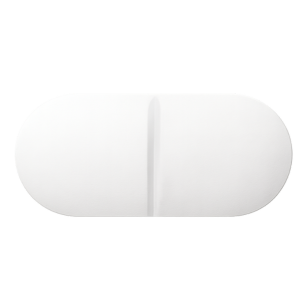
Excedrin Extra Strength
Caffeine
65 mg
Note: Excedrin Extra Strength caplets contain no calories, sugar, or macronutrients. The only active ingredients are acetaminophen (250 mg), aspirin (250 mg), and caffeine (65 mg).
| Attribute | Value |
|---|---|
| Caffeine Level | Moderate |
| Serving Size | 1 caplet |
| Total Caffeine (per caplet) | 65 mg |
| Typical Dose (2 caplets) | 130 mg |
| Calories | 0 |
| Sugar | 0 g |
Excedrin Extra Strength is one of the most widely used over‑the‑counter pain relievers for headaches and migraines. Its effectiveness comes from a combination of active ingredients — including caffeine, which plays a surprisingly important role in how the medication works.
What Is Excedrin Extra Strength?
Excedrin Extra Strength is a pain relief medication designed to target headaches, migraines, and other types of discomfort. It combines three active ingredients that work together to provide fast and effective relief.
Key components include:
- Acetaminophen (250 mg) – A common pain reliever and fever reducer.
- Aspirin (250 mg) – A nonsteroidal anti‑inflammatory drug (NSAID) that reduces pain and inflammation.
- Caffeine (65 mg) – A stimulant that enhances the effects of the other ingredients.
Together, these ingredients make Excedrin Extra Strength more effective than single‑ingredient pain relievers, especially for tension headaches and migraines.
How Much Caffeine Is in Each Excedrin Extra Strength Caplet?
Caffeine is one of the defining features of Excedrin Extra Strength. Each caplet contains a precise amount that contributes to its effectiveness.
Here’s the breakdown per one caplet:
- Caffeine: 65 mg
- Acetaminophen: 250 mg
- Aspirin: 250 mg
Since the typical adult dose is two caplets, a single dose provides 130 mg of caffeine — roughly equivalent to a medium cup of coffee.
This means that if you’re already consuming coffee, tea, or energy drinks, you’ll want to factor in Excedrin’s caffeine to avoid exceeding your daily limit.
Excedrin Extra Strength: Caffeine Compared to Coffee
Many people wonder how Excedrin’s caffeine content stacks up against everyday beverages. The comparison is helpful for understanding its stimulant effect.
Here’s how it compares:
- Excedrin Extra Strength (1 caplet): 65 mg
- Excedrin Extra Strength (2 caplets): 130 mg
- 8 oz brewed coffee: 95–135 mg
- 8 oz black tea: 40–70 mg
- 12 oz cola: 30–40 mg
In other words, taking two caplets of Excedrin Extra Strength delivers about the same caffeine as a full cup of coffee.
This makes it important to monitor your total caffeine intake throughout the day, especially if you’re sensitive to stimulants.
Why Caffeine Is Added to Excedrin Extra Strength
Caffeine isn’t just an extra ingredient — it has a specific purpose in pain relief. It enhances the effectiveness of acetaminophen and aspirin, making the medication work faster and more efficiently.
Here’s why caffeine is included:
- Boosts absorption – Helps the body absorb pain relievers more quickly.
- Enhances effectiveness – Increases the pain‑relieving power of acetaminophen and aspirin.
- Constricts blood vessels – Can reduce headache pain caused by dilated blood vessels.
- Provides alertness – Counters fatigue that often accompanies migraines.
Because of these effects, caffeine is considered a key part of Excedrin’s formula, not just an optional additive.
How Excedrin’s Caffeine Content Compares to Other Pain Relievers
Not all over‑the‑counter pain relievers contain caffeine. Excedrin stands out because of its stimulant component.
Here’s a quick comparison:
- Excedrin Extra Strength (per caplet): 65 mg caffeine
- Excedrin Migraine (per caplet): 65 mg caffeine
- Tylenol Extra Strength: 0 mg caffeine
- Advil (Ibuprofen): 0 mg caffeine
- Aleve (Naproxen): 0 mg caffeine
This makes Excedrin unique among common pain relievers, offering both pain relief and a caffeine boost.
For people who are caffeine‑sensitive, however, this may be a drawback compared to caffeine‑free alternatives.
Potential Side Effects of Caffeine in Excedrin
While caffeine can improve pain relief, it also comes with potential downsides — especially if combined with other caffeine sources.
Possible side effects include:
- Jitters or restlessness
- Increased heart rate
- Difficulty sleeping (insomnia)
- Upset stomach
- Headache rebound if used too frequently
These effects are more likely if you exceed the recommended dosage or consume additional caffeine from coffee, tea, or energy drinks.
Used responsibly, Excedrin Extra Strength can be an effective tool for headache relief, but it’s best to stay mindful of your total daily caffeine intake.
